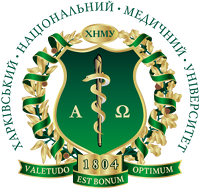Please use this identifier to cite or link to this item:
http://repo.knmu.edu.ua/handle/123456789/3355| Title: | The role of subclinical renal dysfunction in patients with chronic heart failure |
| Authors: | Mykhailova, Iuliia Кравчун, Павло Павлович Kravchun, Pavlo P. |
| Issue Date: | May-2013 |
| Citation: | Mykhailova Iu. The role of subclinical renal dysfunction in patients with chronic heart failure / Iu. Mykhailova, P. Kravchun // 6th International Scientific Interdisciplinary Conference (ISIC) for medical students and young doctors, Kharkiv, 16–17 May 2013 : Abstract book / KhNMU. – Kharkiv, 2013. – Р. 76. |
| Abstract: | The prognosis and outcome of patients with chronic heart failure (CHF) is greatly influenced by renal function. The aim of the study was to examine the severity and origin of the violations of glomerular (creatinine (Cr), GFR, Cystatin C (CsS)), tubular (urine-β2-microglobulin (β2-MG)) functions, the activity of transforming growth factor-β1 (TGF-β1) in CHF and CHF, accompanied by chronic kidney disease (CKD) patients. The study was performed including 103 patients with CHF (66,8±9,8 years). The I group -61 patients with "isolated" CHF, the II group- 42 patients with CHF and CKD. The control group comprised 20 healthy persons. The levels of TGF-β1, CsC, β2-MG were examined by ELISA, the levels of Cr were determined by Jaffe - method; the GFR – by MDRD formula. In group I identified a significant increase of Cr by 22,9% (p<0,05), CsC by 48,3% (p< 0,05), β2-MG by 56% (p<0,05), TGF-β1 by 81,4% (p<0,05), decrease of GFR by 27,4% (p<0,05), compared with the control group. In II group the levels of Cr increased by 66,3% (p<0,01), CsC by 83,3% (p<0,01); β2-MG by 113,9% (p<0,01), TGF-β1 by 122,8% (p<0,01), GFR decreased by 48,5% (p<0,01), compared with the control group. Were detected subclinical renal dysfunction in CHF and CHF, accompanied by CKD patients. It demonstrates by determination of biomarkers and calculation of indicators of glomerular function (CsC, Cr, GFR), markers of tubular damage - (β2-MG as an indicator of proximal tubular function) and TGF-β1 – growth factor, which reveals the activity of interstitial fibrosis. The additional increase of TGF-β1 in patients with CHF, accompanied by CKD in comparing with CHF without CKD reflects the relationship between the formation of kidney fibrosis and overexpression of cytokine-growth factor, which regulates the process of formation of collagen and nephrotoxic changes in renal interstitial tissue. |
| URI: | https://repo.knmu.edu.ua/handle/123456789/3355 |
| Appears in Collections: | Наукові роботи молодих вчених. Кафедра внутрішньої медицини № 2 і клінічної імунології та алергології ім. ак. Л.Т. Малої |
Files in This Item:
| File | Description | Size | Format | |
|---|---|---|---|---|
| Mykhailova Iuliia.doc | 30 kB | Microsoft Word | View/Open |
Items in DSpace are protected by copyright, with all rights reserved, unless otherwise indicated.

